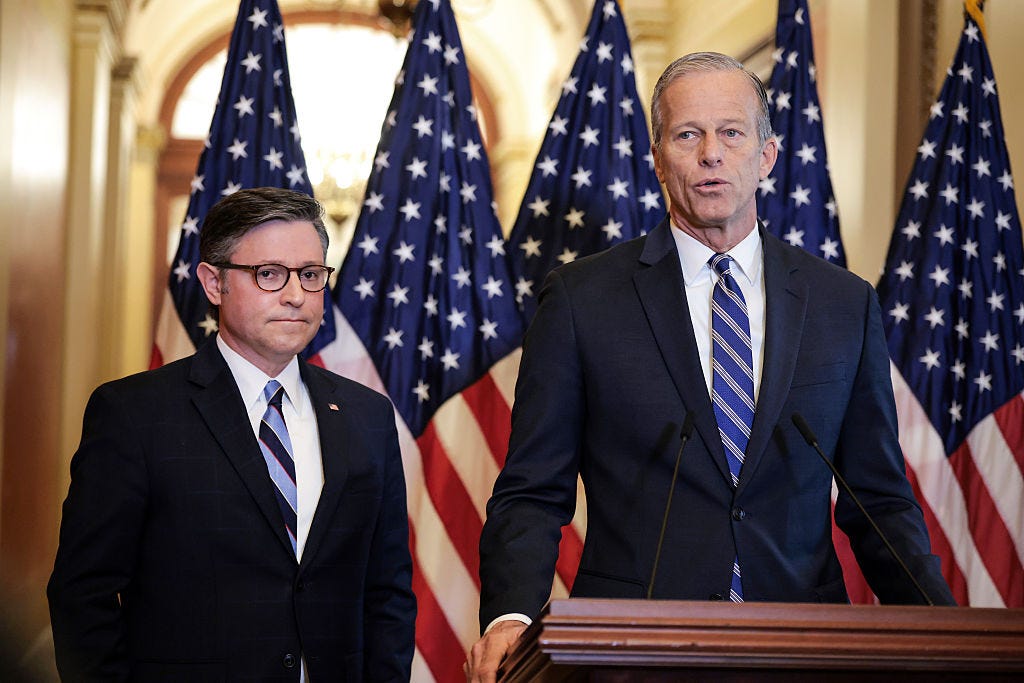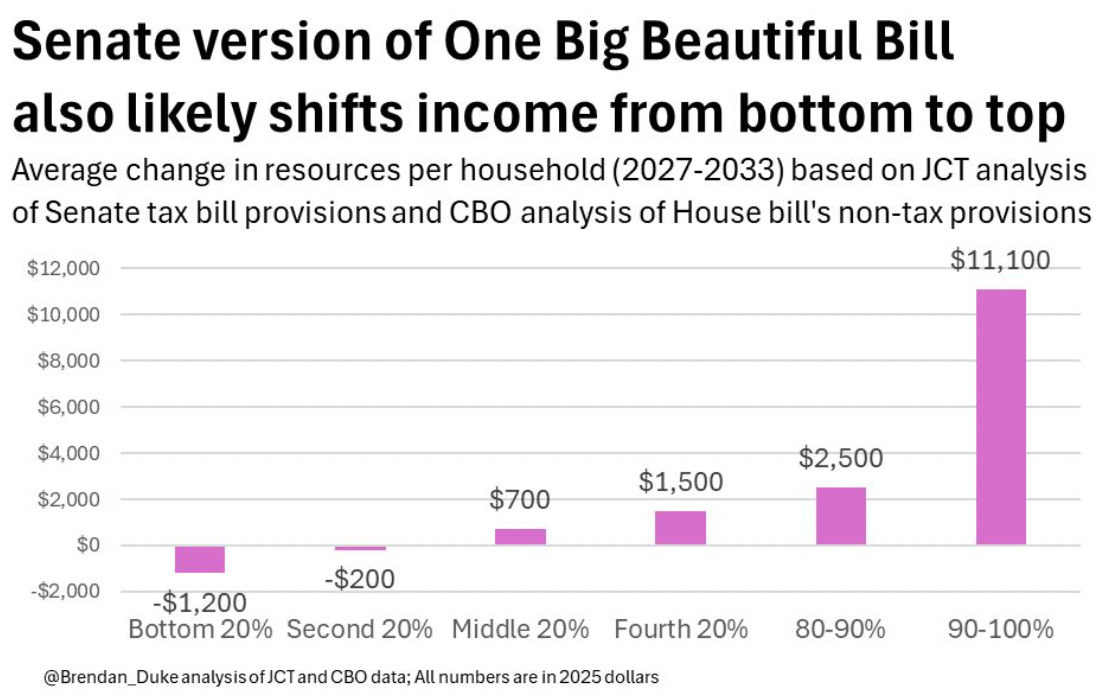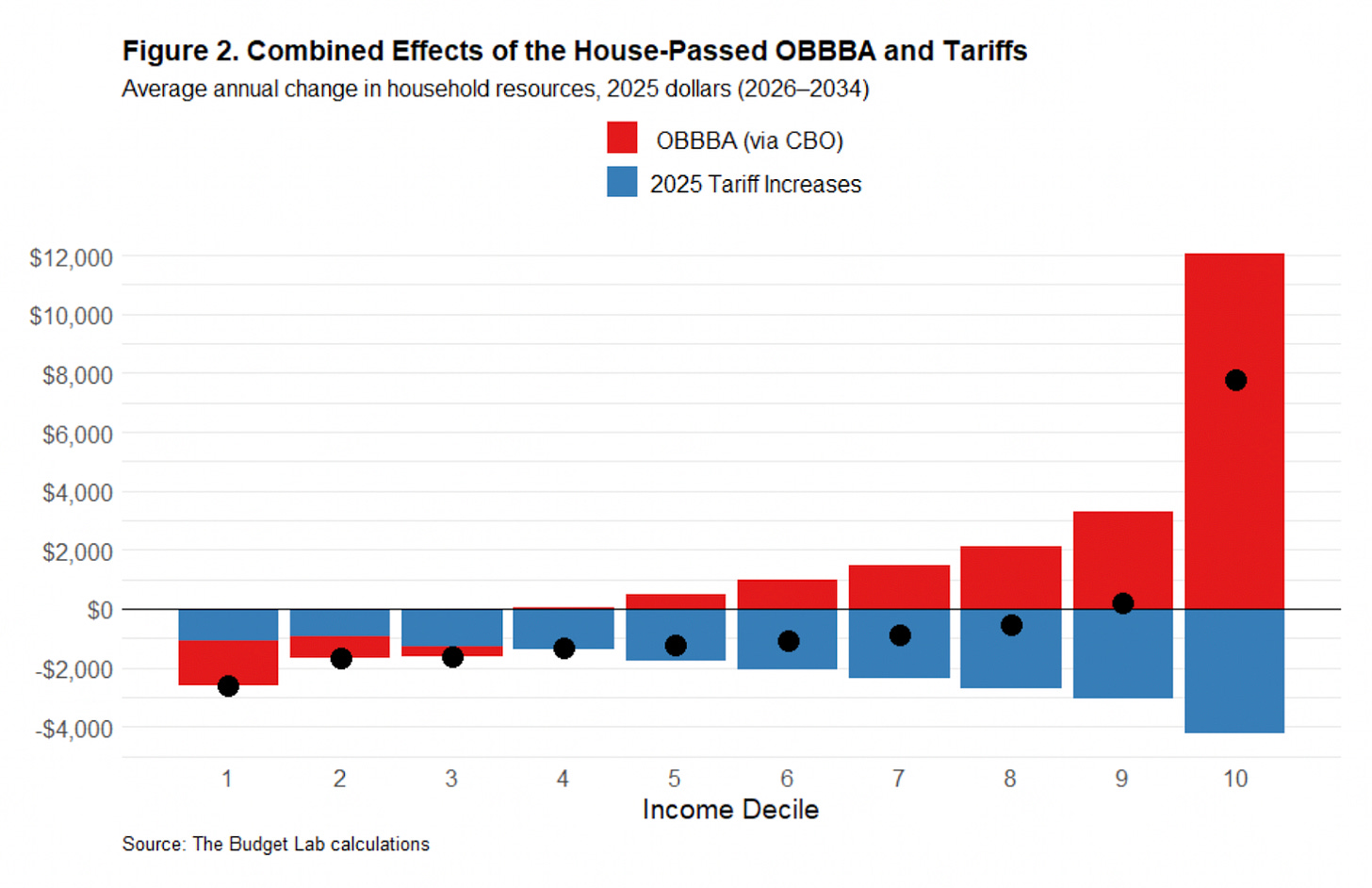7 things everyone should know about Trump's megabill

The Republican reconciliation legislation, which Trump calls his "big, beautiful bill," is massive. The latest version, released by Senate Republicans just after midnight on Friday, is 940 pages. For the wealthiest 10% of Americans, the megabill would make them even richer. But it will also inflict pain on millions of vulnerable Americans, dramatically increase the deficit, finance an unprecedented crackdown on immigrants, and send tens of billions to military contractors for dubious new projects.
The bill cleared a key procedural vote on Saturday, when the Senate voted 51-49 to end debate. Two Republican Senators, Thom Tillis (R-NC) and Rand Paul (R-KY), joined all Senate Democrats in opposing the measure. Senate Republican leaders held the vote open for hours and pressured the last few holdouts to advance the legislation. Now, Senate Republicans are barreling toward a final vote on Monday in an effort to get the bill to Trump's desk by his self-imposed deadline of July 4.
The bill is a moving target. Some provisions will be struck due to obscure Senate rules triggered by the reconciliation process, which allows Republicans to bypass a Democratic filibuster. Also, before a final vote, the bill will be subject to an amendment process that could significantly alter the legislation.
Final passage in the Senate is not a certainty; it's possible that the two Republican Senators who supported the procedural vote will oppose final passage. And even if the Senate approves the legislation, this version of Trump's megabill would need to pass the House, where Republicans operate with very thin margins.
But Trump and his allies will apply maximum pressure to jam the megabill through the Senate and House. There is a real possibility that the 940-page bill, or something very similar, will become law.
Here are seven things everyone should know about Trump's megabill:
1. Trump's megabill would cut $930 billion from Medicaid
Approximately 71 million people rely on Medicaid for healthcare. This is especially true in rural communities, "where Medicaid covers 1 in 4 adults." Trump's megabill would cut funding for Medicaid by $930 billion.
The Senate bill uses two primary mechanisms to cut Medicaid spending.
First, it imposes a strict work requirement for most adults without children or those with children 15 or older. There are exemptions for individuals with disabilities, pregnant women, and certain other groups. While this may seem straightforward, it ultimately strips health insurance from individuals who are either unable to find work or are unable to meet the bureaucratic requirements to prove they have been employed. As a result, millions of Americans will lose their Medicaid coverage.
Second, the Senate bill severely restricts the taxes that states can charge healthcare providers, a tactic that many states rely on to increase federal funding and, ultimately, the resources available to reimburse providers. The change would reduce funding for Medicaid by hundreds of billions of dollars. Rural communities, which rely on these taxes to keep hospitals afloat, would be particularly hard-hit. In response, the Senate created a $25 billion fund to support rural hospitals; however, the tax change would cost rural hospitals $119 billion over the next 10 years. It could force hospitals in some rural communities to close. Others would see a reduction in the quality of care provided.
To win the support of Senator Ron Johnson (R-WI), Senate leadership agreed to support an amendment that would further cut Medicaid spending — beyond $930 billion. It would slash federal spending to states that have expanded Medicaid under the Affordable Care Act. The federal government currently covers 90% of Medicaid expansion costs. It's unclear how much the federal contribution would be reduced under Johnson's amendment or whether Johnson and other Senate hardliners will support the bill if the amendment fails.
Previously, Trump insisted that the legislation is "not cutting Medicaid" and pledged to veto any bill that cuts Medicaid funding beyond "waste, fraud, and abuse."
2. Trump's megabill would increase the number of people without health insurance by 11.8 million
A new analysis by the Congressional Budget Office (CBO), which provides non-partisan budget analysis to Congress, estimates that Trump's megabill "would increase by 11.8 million the number of people without health insurance in 2034." This is due to both the Medicaid cuts and changes to the Affordable Care Act marketplaces that make it harder for people to enroll.
An additional 4.2 million people will lose their health insurance because the bill allows the enhanced premium credits under the Affordable Care Act, implemented during the Biden administration, to expire.
Larry Levitt of the Kaiser Family Foundation called the bill "the biggest rollback in federal support for health care ever."
3. Trump's megabill would slash nutrition assistance to poor families by $186 billion
Trump's megabill slashes funding for the Supplemental Nutrition Assistance Program (SNAP) by $186 billion. This is achieved primarily by shifting financial responsibility for the program from the federal government to the states, which will ultimately result in benefit cuts.
Currently, the federal government splits the cost of administering SNAP with the states and covers the cost of all benefits. The legislation would reduce the federal contribution for administrative costs to 25%. It would also require many states to pay a portion of the benefit costs based on their benefit "error rate." The error rate includes both overpayments and underpayments.
It also imposes work requirements on individuals with children aged 14 or older, and those between the ages of 50-64.
SNAP "provides monthly payments for food purchases to low-income residents generally earning less than $1,632 monthly for individuals, or $3,380 monthly for a household of four." In February 2025, "22.5 million households were enrolled in SNAP, receiving an average monthly household benefit of $353."
4. Trump's megabill would mean lower incomes for the poorest 40% of households
Trump's megabill extends his 2017 tax cuts, which primarily benefited corporations and the wealthy but reduced rates for everyone. The megabill also implements a variety of populist tax proposals Trump promised in his campaign, including eliminating taxation on tips and overtime.
But many people who collect tips don't earn enough annually to pay federal income taxes. And overtime pay is a relatively small portion of income for most eligible workers. As a result, the benefits of these provisions to low-income workers are small.
For the bottom 40% of earners, the tax cuts are swamped by the healthcare, nutrition, and other benefit cuts in other provisions of the bill. That means, according to a new analysis by Brendan Duke of the Center on Budget and Policy Priorities, if Trump's megabill becomes law, the bottom 40% of earners will end up with less income.
If one considers Trump's tariff policy, which is a tax on American consumers, the situation gets even worse. An analysis of the House version of Trump's megabill by the Budget Lab at Yale found that, combined with the impact of tariffs, only those in the top 10% will be better off.
Although there are some changes to the Senate version of Trump's megabill, according to John Ricco of Yale Budget Lab, none of these changes would fundamentally alter the results of this analysis.
5. Trump's megabill would increase the deficit by at least $3.3 trillion
Despite deep cuts to Medicaid and nutrition assistance, Trump's megabill still dramatically increases the deficit. The latest analysis by the CBO reveals that the Senate version of the megabill will add at least $3.3 trillion to the deficit over the next 10 years. This far exceeds the $2.4 trillion deficit increase under the House version. The Senate number could increase if money-saving provisions are required to be cut as part of the reconciliation process.
6. Trump's megabill includes $45 billion for new immigration jails
The Senate version of Trump's megabill includes an eye-popping $172 billion to finance a massive immigration crackdown. That exceeds the annual military spending of every other country on earth, except for China.
The figure includes $45 billion for ICE for new immigration jails, more than 13 times the current budget. An additional $14.4 billion is allocated to ICE for enforcement and removal actions, and $8 billion for hiring and retention.
The massive influx of funding would give ICE a larger budget for jails than the Federal Bureau of Prisons and enough money to hire more agents than the FBI.
Another $50 billion would be allocated to completing a wall along the southern border, a project that has proven to be both ineffective and dangerous.
7. Trump's megabill would send billions to defense contractors for dubious projects
The Senate version of Trump's megabill includes $158 billion in new defense spending. That includes $25 billion to get started on the "Golden Dome," a space-based missile defense system many experts believe will be ineffective and may ultimately cost as much as $500 billion.
The legislation also includes $29 billion for new ships, $23 billion for more munitions, and $15 billion for nuclear weapons. Most of this money will be funneled from the Department of Defense to military contractors. Combined with the Trump administration's budget request, it will push the United States' total annual military spending to over $1 trillion.




Senator Tillis has finally grown a spine to stop this. As has Rand Paul. What say you Hawley, Murkowski and Collins? It’s rough being the Senator of a rural state, isn’t it, when your leaders BBB pits the interests of the wealthiest 1% against the health and economic welfare of your entire population. Are you ready for the final decimation of the rural populations of your states?
All these things are terrible about the "Big Beautiful Bill," and we're only scratching the surface. Michael Thomas posted yesterday about how this legislation is also a "kill shot" aimed squarely at the renewable energy industry. It's catastrophically bad. https://open.substack.com/pub/heated/p/the-senate-is-about-to-destroy-clean?utm_source=share&utm_medium=android&r=ftyx